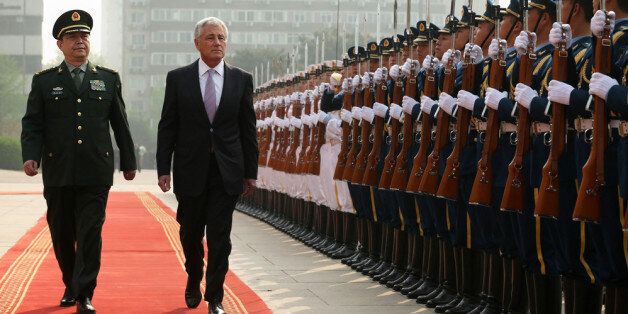U.S. Secretary of Defense Chuck Hagel is spending much of this week attempting to build bridges with China’s military establishment in Beijing, but Chinese netizens greeted Hagel with widespread criticism on issues ranging from U.S. support for Japan to cybersecurity conflicts between the countries.
“The American Secretary of Defense’s trip to Asia is about pumping up the U.S.’s allies in Asia,” one commenter wrote on China’s most popular micro-blogging site, Sina Weibo. “What happened in Crimea made them worry that the U.S. will sell them out at a critical moment.
“If we just act like Russia we’ll prove once again that even when dealing with China, America’s little friends are destined to be sacrificed. When that happens, America’s days in Asia are over.”
Tensions in East Asia have heated up in recent years, with China locked in bitter territorial disputes with Japan, the Philippines and Vietnam. While the United States’ official stance is to not get involved in such disputes, its alliances with Japan and the Philippines remain a major sore point in Beijing. Chinese officials claim that the alliances embolden hardliners in countries like Japan to take more aggressive action on territorial conflicts knowing that the U.S. has their back.
China ratcheted up these tensions by declaring an Air-Defense Identification Zone (ADIZ) in November, which requires aircrafts flying over parts of the East China Sea to identify themselves to the Chinese military in advance. In Beijing on Tuesday, Hagel reiterated U.S. objections to China’s unilateral establishment of the ADIZ.
“Every nation has a right to establish an air defense zone, but not a right to do it unilaterally with no collaboration, no consultation,” Hagel said. “That adds to tensions, misunderstandings and could eventually add to, and eventually get to, dangerous conflict.”
Hagel’s comments were bashed by many Chinese micro-bloggers, who pointed to ADIZs that were established by the United States and Japan during the Cold War.
“May I ask, when you set up these ADIZ’s did you consult with China?” one commenter asked on Sina Weibo. “Hypocritical Yankees, American devils.”
While touring Asia, Hagel appears to be balancing support for America’s traditional allies with nods to China’s growing influence in the region. After warning China against “coercion and intimidation” on territorial disputes during a short visit to Japan on Sunday, Hagel became the first foreigner to set foot on China’s only aircraft carrier the following day. The gesture seemed designed to show respect for China’s growing military might.
But following a speech at China’s National Defense University on Tuesday, Hagel was grilled by military officials who accused the U.S. of attempting to contain China’s growing geopolitical power. One military researcher claimed the U.S. was trying “to make trouble for China to hamper its development” out of fear that “one day China will be too big a challenge for the U.S. to cope with.”
Chinese micro-bloggers expressed similar sentiments: “From this trip we once again see what the American authorities mean by ‘new great power relations’: they say one thing and do another, shake our hand onstage and kick us in the leg offstage,” a Sina Weibo user wrote after the speech.
“It’s all for one goal: contain China and protect America’s hegemonic status,” the user continued. “Once we see this clearly, we can’t maintain any illusions but must be strong and self-reliant.”
Many of China’s netizens also lambasted U.S. government activities on the issue of cybersecurity. In early 2013, tensions increased between the two countries due to accusations that the Chinese military was involved in hacking attacks on the U.S. But documents leaked by former National Security Agency contractor Edward Snowden have revealed widespread U.S. government hacking of foreign governments and even Chinese companies.
“Americans have already lost their confidence. From listening in on allies to conducting surveillance on enemies, it has all exposed the hypocritical face of Americans,” a Sina Weibo commenter wrote. “From this you can see that Americans are not so big and powerful anymore. At the very least they’re timid and afraid of being found out.”
In recent months, U.S. officials have attempted to clear the air through more honest disclosures to Chinese officials about U.S. cybersecurity policies. On Tuesday Hagel called on China to match those efforts, but many Chinese netizens dismissed the suggestion.
“Would you talk morality with a prostitute?” one Sina Weibo user remarked.





